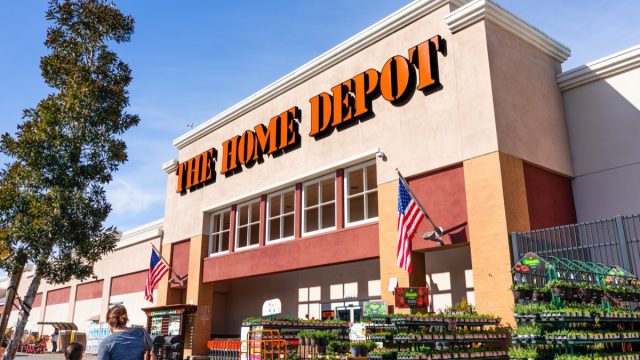Home Depot Slammed for Selling Banned Products

Gardening and home renovation season is officially upon us. If growing your own vegetables, building an outdoor firepit, or remodeling your kitchen is on your summer to-do list, odds are you’ll spend a lot of time perusing the aisles at Home Depot. The surge in foot traffic will be a warm welcome for the home improvement chain, whose comparable sales have been down for six consecutive quarters. However, Home Depot’s recent banned product controversy may prompt shoppers to abandon the retailer for good.
RELATED: Target Scam Exposes “Enormous Issue” With Self-Checkout.
On June 27, the Washington Department of Ecology (WDE) issued a $1.6 million fine to Home Depot for selling banned hydrofluorocarbon (HFC) products despite the environmental regulatory agency’s extensive attempt to bring the retailer into compliance.
The massive penalty has been two years in the making, as Home Depot has continued to sell these prohibited HFC products, which WDE claims are “potent” to the earth’s protective ozone layer.
“HFCs are chemicals made up of hydrogen, fluorine, and carbon. They are commonly used in air conditioning and refrigeration, in producing insulating foams, and as propellants. These greenhouse gases are a short-lived ‘super pollutant’ and can be thousands of times more powerful than carbon dioxide,” the agency explains on its website.
Since 2019, the Washington Legislature has passed laws to gradually phase out the use of HFC products. As part of that initiative, the WDE has partnered with companies to help them ethically comply with the law.
In July 2021, it became illegal to sell R-134a canisters at retail stores. According to the WDE, R-134a is an HFC refrigerant found in car AC systems, with a “global warming potential 1,430 times that of carbon dioxide.” In other words, it has the potential to do a lot of damage to our environment.
“Restricting HFC products and equipment is key to achieving the state’s statutory greenhouse gas emission limits and ultimately getting to net zero by 2050,” said Joel Creswell, who manages Ecology’s Climate Pollution Reduction Program, in the release. “HFCs safely sealed inside air-conditioning systems can be recovered, recycled and re-used, but when they leak out, they become a major contributor to climate change.”
RELATED: Shoppers Are Abandoning Costco for Sam’s Club—Here’s Why.
With Washington’s HFC regulations in place, the WDE notified businesses how to comply with the new laws, which went into effect in Nov. 2021. While most companies voluntarily took action, the WDE said Home Depot did not. Instead, the home improvement retailer kept R-134a canisters readily available to customers in-store and online.
The WDE said the agency hosted technical assistance meetings with Home Depot’s compliance teams between 2021 and 2023 to remove HFC products from the retailer’s website. “[The WDE] was assured that the identified products would not be available for purchase in Washington and that no new prohibited products would be added to the website,” per the release.
However, a routine compliance check in July 2023 showed that Home Depot was still selling R-134a canisters. It was revealed that 1,058 units of the banned products were purchased in Washington between April 2022 and Sept. 2023.
Home Depot is being fined $1,500 per violation for a total of $1.6 million. However, the WDE reduced the amount, which was originally set to $10,000 per violation. Home Depot has 30 days to appeal the HFC products penalty to Washington’s Pollution Control Hearings Board.